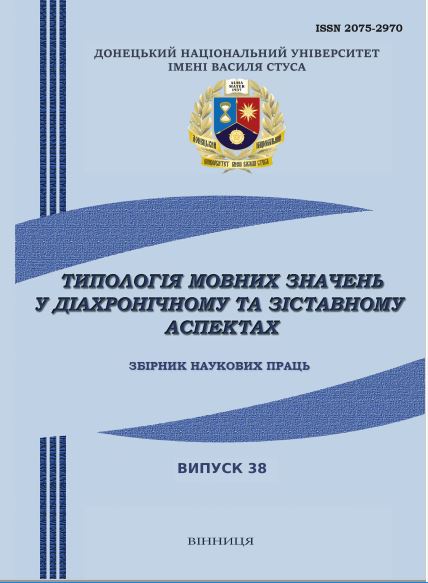Structural Peculiarities of Lexico-phraseological Field of Hypoconcept ‘Unnatural Death’ in Modern German.
DOI:
https://doi.org/10.31558/2075-2970.2019.38.4Keywords:
hypoconcept, cognitive picture of the world, nominative field, linguocultural space, category of reflexivityAbstract
The paper under consideration investigates the fragments of German linguistic and cognitive picture of the world, which reflects the role of the universal hypoconcept ‘Unnatural death’ and the peculiarities of its perception by the German-speaking society. On the basis of the analysis of lexical and phraseological units representing the researched hypoconcept, the classification has been developed using the component analysis, the heterogeneity of the investigated hypoconcept has been revealed. Empirical research shows that unnatural death is objectivated in the language by means of lexical and phraseological units which can be grouped into «murder», «suicide», and «accident» on the basis of common semantic components. The differential semantic components have also been singled out which allowed to characterize the group «murder» more precisely considering such aspects as the aim of murder, mass character, methods and ways of committing a crime. The conducted research demonstrates that most lexemes which represent the notion of suicide in the German language are distinguished by the category of reflexivity.
The analysis of lexicographic sources makes it possible to construct a nominative field and to characterize the actualization of the hypoconcept ‘Unnatural death’ by such categories as methods, purpose, mass character of intentional murder, methods and types of suicide and accidents. The density of the nominative field proves the significance of this phenomenon in the German linguistic picture of the world and indicates the indifference of the German people towards the manifestation of violence. Phraseological and lexical units used as euphemisms commonly refer to such phenomena as crime, murder, death, moral and physical disabilities.
References
Binovich, L. (1995). Nemetsko-russkiy frazeologicheskiy slovar. М. : Аkvarium.
Duden: Das große Wörterbuch der deutschen Sprache. Retrieved November 11, 2019 from http://www.duden.de/
Huseva, A. (2008). Osnovy lingvokognitivnogo modelirovaniya leksiko-frazeolohicheskih polei v nemetskom i russkom yazykah: diss … d. filol. n. M. : Izdatel’stvo MHOU.
Karasik, V. (2004). Yazykovoi krug: lichnost’, kontsepty, diskurs. M. : Gnozis.
Karaulov, Yu. (1972). Struktura leksiko-semanticheskogo polia. Filologicheskiye nauki. № 1. S. 67
Kobozeva, I. (2000). Lingvisticheskaya semantika. М. : Editorial URSS.
Kocherhan, M. (2006). Osnovy zistavnoho movoznavstva. К. : Akademiya.
Lihachiov, D. (1993). Kontseptosfera russkogo yazyka. Izv. AN. Seriya literatury i yazyka. Т. 52. № 1. S. 3‒9.
Medychna entsyklopediya. Retrieved November 2, 2019 from http://medical-enc.com.ua/
Popova, Z., Sternin, I. (2007). Kontrastivnaya lingvistika. M. : AST “Vostok – Zapad”.
Schemann, H. (2011). Deutsche Idiomatik. Wörterbuch der deutschen Redewendungen im Kontext. Berlin.
Skab, M. (2008). Zakonomirnosti kontseptualizatsiyi ta movnoyi katehoryzatsiyi sakralnoyi sfery. Chernivtsi.

